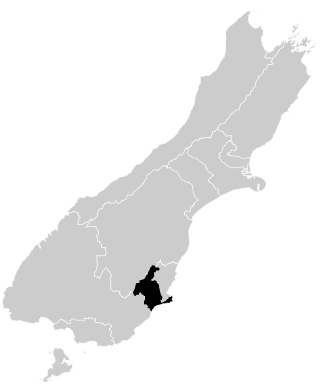Related Research Articles

The 1881 New Zealand general election was held on 8 and 9 December in the Māori and European electorates, respectively, to elect 95 MPs to the 8th session of the New Zealand Parliament.

Coromandel is a New Zealand electoral division returning one member to the House of Representatives. It is currently represented by Scott Simpson, a member of the National Party.

Dunedin South is a former New Zealand parliamentary electorate. It first existed from 1881 to 1890, and subsequently from 1905 to 1946. In 1996, the electorate was re-established for the introduction of MMP, before being abolished in 2020.
Taranaki was a New Zealand parliamentary electorate that existed for three periods between 1881 and 1996. It was represented by nine Members of Parliament.
Manukau is a former New Zealand parliamentary electorate in the south Auckland Region. It existed from 1881 to 1978, with a break from 1938 to 1954. It was represented by nine Members of Parliament. Two by-elections were held in the electorate.
Awarua was a New Zealand parliamentary electorate from 1881 to 1996.
Wellington South is a former New Zealand parliamentary electorate. It existed for two periods between 1881 and 1946. It was represented by seven Members of Parliament.
Christchurch North is a former New Zealand parliamentary electorate. The electorate comprised the northern half of what is now considered the Christchurch Central City.
St Kilda is a former New Zealand parliamentary electorate. It existed from 1946 to 1996 and was represented by four Members of Parliament.
Foxton is a former parliamentary electorate in the Manawatū-Whanganui and Wellington regions of New Zealand, from 1881 to 1890.
Caversham was a parliamentary electorate in the city of Dunedin in the Otago region of New Zealand, from 1866 to 1908.
Wellington West was a parliamentary electorate in the western suburbs of Wellington, New Zealand, from 1938 to 1946. It was represented by two Members of Parliament, including Catherine Stewart, the country's second female MP. It was succeeded by the Karori electorate.
Te Aro was a parliamentary electorate in Wellington, New Zealand from 1881 to 1890. It covered the southern area of the central business district. During the three parliamentary terms of its existence, the electorate was represented by three Members of Parliament.
St Albans was a parliamentary electorate in Christchurch, New Zealand from 1881 to 1890, then from 1946 to 1996.
Dunedin Central was a parliamentary electorate in the city of Dunedin in Otago, New Zealand from 1881 to 1890 and 1905 to 1984.
Dunedin East was a parliamentary electorate in the city of Dunedin in the Otago region of New Zealand from 1881 to 1890.
Hawke's Bay was a parliamentary electorate in the Hawke's Bay Region of New Zealand from 1881 to 1996. In 1986 it was renamed Hawkes Bay.
Oamaru was a parliamentary electorate in the Otago region of New Zealand, during three periods between 1866 and 1978.
Waimate was a parliamentary electorate in the Canterbury region of New Zealand from 1881 to 1893 and from 1946 to 1957. It was represented by three Members of Parliament.
The 8th New Zealand Parliament was a term of the New Zealand Parliament.
References
- McRobie, Alan (1989). Electoral Atlas of New Zealand. Wellington: GP Books. ISBN 0-477-01384-8.
- Wilson, James Oakley (1985) [First published in 1913]. New Zealand Parliamentary Record, 1840–1984 (4th ed.). Wellington: V.R. Ward, Govt. Printer. OCLC 154283103.
- Norton, Clifford (1988). New Zealand Parliamentary Election Results 1946–1987: Occasional Publications No 1, Department of Political Science. Wellington: Victoria University of Wellington. ISBN 0-475-11200-8.